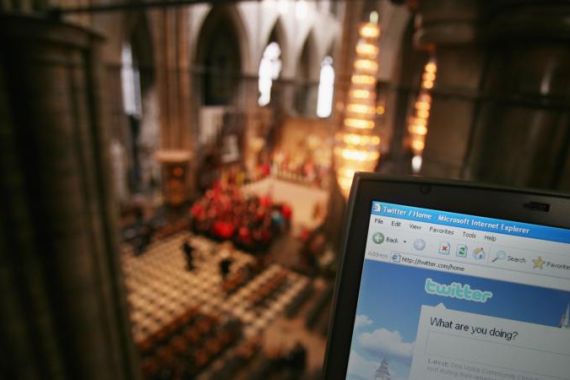Social media harnessed by the far right
Armed with internet platforms, xenophobic groups in Europe spread messages of intolerance against migrants.

 |
| Far right groups are increasingly turning to the internet and social media to spread their messages [GALLO/GETTY] |
Social media is being heralded as a revolutionary weapon for the empowerment of discriminated groups such as migrants. But so far it is the xenophobic far right that has made the most of it.
The discussion about social media tends to focus around famous Internet platforms such as Facebook, Twitter, Blogs and YouTube, but generally refers to any innovative or unorthodox means of communication.
Keep reading
list of 4 itemsHong Kong’s first monkey virus case – what do we know about the B virus?
Why will low birthrate in Europe trigger ‘Staggering social change’?
The Max Planck Society must end its unconditional support for Israel
In contrast to traditional media, social media is usually web-based, highly interactive, inexpensive and easily accessible to consumers, who can turn into producers without much effort.
Its enormous popularity has forced traditional media outlets to adopt many of the features characteristic of social media, such as open commentary sections and uploading of video features.
Many see signs of hope for voiceless migrants in the rise of social media, but what is even truer is that the far-right has benefited the most from the media revolution.
“Racist and xenophobic people took over first because they had not been allowed into mainstream media,” said Arash Mokhtari, a project manager at Quick Response, a Swedish group monitoring media coverage of migrants.
“Before, they resorted to leaflets but by now they’ve become very media-savvy, they are very present in blogs and commentary sections,” he said.
One often cited example is the hijacking of commentary sections in terrorism-related news by xenophobes, who use this platform to insinuate links between terrorism and Islamic communities in Europe.
Nobody denies the potential social media holds to spread any kind of ideas, including messages of tolerance, but uncertainty remains as to how to approach it and as to its actual effectiveness.
“The anti-racist majority society needs to be better at learning from these groups in order to resist them. Social media is very democratic and I believe the situation can be changed,” said Mokhtari.
The issue of how to improve migrant integration through social media was highlighted at a conference hosted by the International Organisation for Migration (IOM) and the Hungarian presidency of the European Union last week in Budapest, Hungary.
“Social media can be used to communicate messages to youth and children in a way that is close to them: Facebook, YouTube or cartoons can all be used to encourage migrants to participate,” said Anke Schuster, project development and liaison officer for the IOM in Brussels.
However, experts have not found a way to measure its exact impact: “New media tools such as Facebook and YouTube offer quantitative data on how many times material was used, but more qualitative evaluations are needed,” Schuster said.
Also, for organisations such as the IOM or other NGOs (non-governmental organisations) it is hard to match the straightforward language that typifies far-right new media.
“Social media provides opportunities to bring our message across but we need to find the right language to communicate it; readers expect a simple, understandable language,” said Jurga Kievisaite, programme manager for IOM.
While media experts agree a simple language is desirable, some are concerned that down-to-earth coverage of migration issues may come at the expense of understanding the complex processes behind migration flows.
Calls for more human interest stories that connect the reader to the often discriminated and voiceless migrant are met with skepticism by those journalists who insist on the need for analysis and background information and who oppose stigmatising migrants and exploiting their emotions.
But as the still largely unregulated social media keeps booming, concerns grow as to whether either type of story will be written in a professional manner by new media actors such as bloggers.
“Bloggers can deceive and lie, they don’t answer to anybody. That may be freedom of expression, but it’s not journalism,” Aidan White, former general secretary of the International Federation of Journalists, said.
“To a part of the population what makes journalism distinctive is a commitment to ethical values. Journalists need to be responsible and accountable,” he added.
Mircea Toma, president of Active Watch, a Romanian media monitory agency, used a more conciliatory tone: “Young people consume more and more new media, so bloggers will become a dominant part of the media landscape. As public communicators they have the ability to influence society, but they are also exposed to the same laws as anyone else.”
Nevertheless, regulation of social media remains a controversial and delicate topic in which the need for professionalism needs to be balanced with the right to freedom of expression.
“Those suggesting regulation have been harshly attacked, it’s considered a dangerous precedent,” said Mokhtari.
“But some steps have been made towards regulations, such as the requirement that people register before commenting online. Anonymity is great but it provides a negative platform for discussion.”
In any case, Mokhtari notes the scope of the new media seems to have changed: “Before, social media was about adopting an identity different from your own, now it is all about who you really are.”
A version of this article was first published by Inter Press Service news agency.